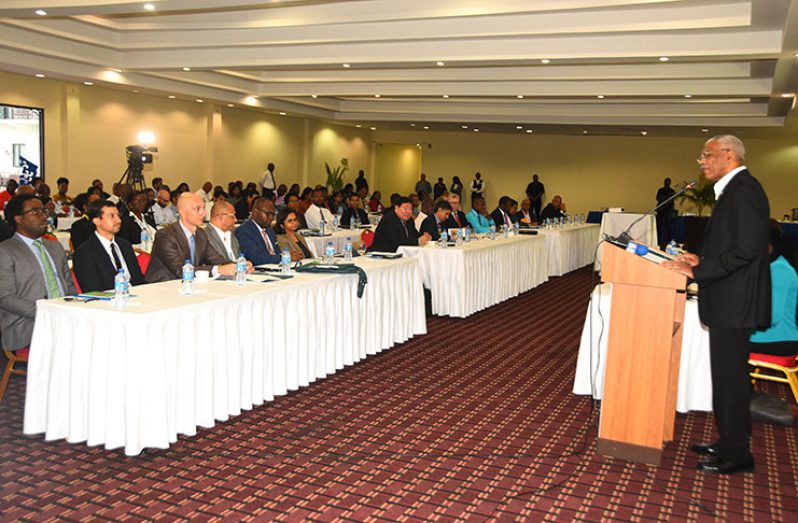…in implementing Green State Development strategy
PRESIDENT David Granger has demonstrated the highest level of leadership and

commitment to the development of a Green State but buy-in from all stakeholders, including political parties is among issues critical for the effective implementation of the Green State Development Strategy, United Nations Resident Coordinator, Mikiko Tanaka, said on Tuesday.
The UN Resident Coordinator was at the time speaking during the opening ceremony of the first meeting of the Green State Development Strategy Multi Stakeholder Expert Group at Ramada Princess Hotel. President Granger; Regional Coordinator for Resource Efficiency for the United Nations Environment Programme, Adriana Zacarias; and Director of the Department of Environment, Ministry of the Presidency, Ndibi Schwiers; were among the high ranking officials present.
Tanaka said Guyana has been a leader on the international platform with regards to environmental conservation and climate action, and as such, it is not surprising that the Green State Development Strategy will be Guyana’s future National Development Strategy and response to Agenda 2030 and the Sustainable Development Goals (SDGs).
The Green State Development Strategy will chart the way forward for the “greening” of Guyana –a transition that will allow for a green economy built on the renewable, clean and cheaper sources of energy. According to the UN Resident Coordinator, if the Green State Development Strategy is developed effectively as a road map to achieving the SDGs in Guyana, it will promote shared prosperity and ultimately trigger paradigm shift between economic prosperity and human wellbeing.
“It will transform Guyana into an inclusive, equitable and cohesive society founded on principles of good governance and environmental sustainability,” she added but said the strategy’s success is dependent on several important factors.
“Strong National Leadership and broad-based ownership is a perquisite,” Tanaka posited. While acknowledging the high-level commitment made by the President to the effective implementation of the Green State Development Strategy, she said the process must entail the broadest possible consultation that is truly inclusive and empowering. Tanaka emphasized that citizens should not be passive beneficiaries of development but rather should be “active shapers and contributors of development.”
“Buy-in from across the political spectrum is critical for continuity and consistency in implementing the strategy towards promotion of the goals by 2030,” the UN Resident Coordinator added while underscoring that the strategy cannot and should not be addressed in silos.
Importantly too, Tanaka said no one must be left behind in the process. “A wide range of exclusions, discriminations, and societal divisions would need to be tackled. Gender inequality, rural-urban, coastal-hinterland disparities, marginalisation of vulnerable groups, disenfranchised youths, people with disabilities, and minorities of all kinds, their voices must be heard and their diverse challenges and needs have to be understood to identify solutions that enable people access to opportunities and services,” the UN Resident Coordinator stated.
In delivering the keynote address, President Granger pointed out that long before the Paris Agreement, during the 11th Commonwealth Heads of Government Meeting in Malaysia in October 1989, Guyana committed 371, 000 hectares of its forest – an area larger than Malta, the Maldives or Monserrat – to be used as a model for conservation and sustainable development.
Today that area is known as the Iwokrama International Centre for Rainforest Conservation and Development (IICRCD) – located at the centre of the Guiana Shield.
Additionally, in signing the Paris Climate Agreement, President Granger said Guyana further committed two million hectares for conservation purposes. In its pursuit of a Green Economy, the country has committed to contribute to both a sustainable future and to an effective global response to climate change.
He said as Guyana transitions into a Green State, transformation must take place at all levels – at the level of the household, community, region, nation and the international community. He noted that the establishment of the Department of Environment in October 2016 was a step in that direction. “It represents our resolve to ensuring a holistic and rational approach to environment conservation and management,” he posited.
“The Green Statement Development Strategy is intended to impact on the livelihood of every citizen in our country by allowing for the protection of our biodiversity and the promotion of ecotourism, eco-education, by allowing for the promotion of energy generation from renewable sources and the introduction of low emission, low carbon manufacture…,” President Granger further added.
It was noted too that through the implementation of the strategy, the country will develop greater economic resilience through the diversification production and the simultaneous reduction of the country’s dependence on fossil fuels. The President is optimistic that the country will be significantly powered by renewable energy by 2025.
Director of the Department of Environment said the strategy is the country’s vision for inclusive growth of every sector of society. “It represents our response to a changing climate, it represents our model for achieving the 2030 Sustainable Development Goals,” she explained.
The main objective of the strategy, she explained, is to reorient and diversify Guyana’s economy by opening up new and sustainable investment opportunities. Schwiers noted that wide spread consultations with stakeholders had resulted in the formulation of a Framework of the Guyana Green State Development Strategy and Financing Mechanism.
“This framework outlines the seven thematic areas to be examined and consulted upon, as we embark on the Green State Development Strategy, the elaboration of these seven thematic areas is based on the principle of inclusivity, as it provides the opportunity for the participation of every Guyanese,” she stated.
Added to that, a UN Environment Coordination Desk has been established to provide technical support to the process. Multi stakeholders Expert Groups have also been formed to provide guidance and feedback on the seven thematic areas. These groups consist of representatives from the Government, Private Sector, Faith Based Organisations, Cultural Groups and Non-Governmental Organisations.


.jpg)











